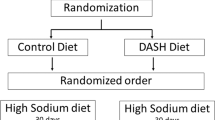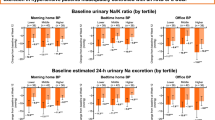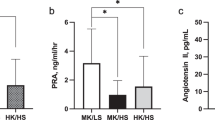Abstract
Nutritional sodium, potassium and calcium are considered to be important regulators of blood pressure (BP). The present study evaluates the effects of combined low-sodium (LS), high-potassium (HK), high-calcium (HCa) diet on BP in patients with mild essential hypertension. Thirty-six patients (26 M, 10 F), 24–67 years of age (mean 46 ± 8), participated in the study. Patients were divided into three groups and given a diet consisting of three 1-month segments, which they followed in different order. Group 1 (n = 11) received LS diet followed by the addition of HCa and then HK. The order in Group 2 (n = 12) was HK-LS-HCa; and in Group 3 (n = 13) it was HCa-HK-LS. The third month of the study all patients were eating a combined LS, HK and HCa diet. Urinary electrolytes were measured to confirm compliance with the diets. After 1 month of the LS diet urinary sodium excretion decreased significantly by 25 mmols/day (95% CI, 1–48 mmols/day); (P < 0.05). eighteen patients did not comply with the diet. systolic bp (sbp) only slightly decreased, from 142 mm hg (95% ci, 137–146 mm hg) to 138 mm hg (95% ci, 133–142 mm hg); (P = 0.11). The change in SBP was related to the change in urinary sodium excretion (R = 0.46; P = 0.006). After 1 month of the HK diet, urinary potassium excretion increased by only 5 mmols/day (P = NS). BP was unaffected by HK and HCa diet. At the end of the study, urinary sodium excretion decreased from 183 mmols/day (95% CI, 155–211 mmols/day) to 148 mmols/day (95% CI, 131–165 mmols/day); (P < 0.05), urinary potassium excretion slightly increased from 75 mmols/day (95% ci, 68–82 mmols/day) to 85 mmols/day (95% ci, 76–94 mmols/day); (P = 0.09), and urinary calcium excretion remained unchanged. BP did not decrease. It is concluded that only the LS diet may be advantageous in patients with mild essential hypertension.
This is a preview of subscription content, access via your institution
Access options
Subscribe to this journal
Receive 12 digital issues and online access to articles
$119.00 per year
only $9.92 per issue
Buy this article
- Purchase on Springer Link
- Instant access to full article PDF
Prices may be subject to local taxes which are calculated during checkout
Similar content being viewed by others
Author information
Authors and Affiliations
Rights and permissions
About this article
Cite this article
Grossman, E., Vald, A., Peleg, E. et al. The effects of a combined low-sodium, high-potassium, high-calcium diet on blood pressure in patients with mild hypertension. J Hum Hypertens 11, 789–794 (1997). https://doi.org/10.1038/sj.jhh.1000471
Received:
Accepted:
Issue Date:
DOI: https://doi.org/10.1038/sj.jhh.1000471



